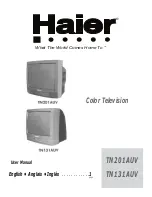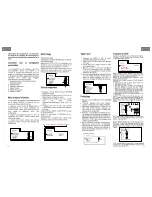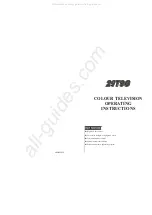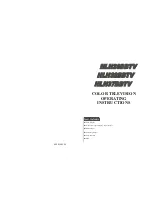
36
Using BRAVIA Sync with
Control for HDMI
The BRAVIA Sync function on this TV
communicates with other Sony equipment
supporting the
Control for HDMI
function.
To connect Sony equipment with Control
for HDMI
Use an HDMI cable that bears the HDMI logo for
connection. See pages 12 to 15 or see the HDMI
connection shown in the Quick Setup Guide
provided with the TV documentation.
Setting the Control for HDMI
The
Control for HDMI
function must be set up in
order for the TV to communicate with other
Control for HDMI
enabled equipment. See
page 51 for information on how to set up this TV’s
Control for HDMI
function. For other
equipment, refer to its operating instructions.
Available options using Control for HDMI
The following operations are available after you
connect the supported Sony equipment with
Control for HDMI
function to your TV:
• Automatically turn off the connected equipment
when you turn off the TV.
• The TV will automatically turn on and select the
respective HDMI input through the connected
equipment by One-Touch-Play.
• Equipment listed under the
External Inputs
on
the
XMB
™
will turn on automatically when
• Possible operations with
BRAVIA Sync
buttons, see page 19.
When a Sony A/V receiver with BRAVIA Sync is
connected, the following additional operations are
possible:
• Turning on the A/V receiver when the TV is
turned on.
• Automatically switching to the audio output of
the A/V receiver’s attached speakers.
• Adjusting the volume and muting of the A/V
receiver with the TV’s remote control.
~
• The A/V receiver cannot be selected from the
XMB
™
.
Using DIGITAL MEDIA PORT
Adapter
Connecting a DIGITAL MEDIA PORT
(DMPORT) adapter lets you display photos and
play videos and music from a portable player on
your TV.
The DMPORT adapter’s menu and portable player
can be controlled via the TV’s remote control. The
DMPORT input can be selected by pressing
INPUT
.
By pressing
m
,
PLAY
,
PAUSE
,
M
or
STOP
you may be able to navigate through the portable
player’s menu.
~
• Viewing the equipment’s menu on the TV and
controlling it via the TV’s remote control depends on
the equipment; refer to the portable player’s operating
instructions.
• Available DIGITAL MEDIA PORT adapters vary in
each area.
• Do not connect an adapter other than the DIGITAL
MEDIA PORT adapter.
• If the portable player is capable of sending video
signals, then the DIGITAL MEDIA PORT will have
video output. In this case, the system outputs a
composite video signal.
• Check compatibility between portable player and the
DIGITAL MEDIA PORT adapter.
• The output volume level between the DMPORT input
and TV or other equipment input may be significantly
different; adjusting the TV or other equipment’s
volume may be necessary.
















































